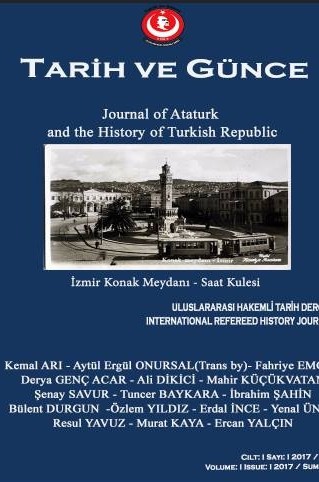The View and the Attitude of Allies High Commissioners Toward Istanbul During the Declaration of National Pact
The Ottoman State entered into a new process with the
Mondros Armistice Treaty in which it was declared defeat from the World War I
and the uncoocupied part of the country were subjected to occupation movements
of the Allied Powers. During this period, while Ottoman Government was trying
to react against occupations by diplomatic channels, it had diplomatic
negotiations with the Allied Powers, especially Britain at Paris Peace
Conference where the future of the State was to be determined. But despite the
attitude of the government, with the passing of Mustafa Kemal to Anatolia, the
organization of resistance in Anatolia against the occupations had put a
struggle for Allies that they had never thought of in the Near East. This was
also the beginning of a new era in which that would change the post-war Allied
plans completely for Anatolia and Middle East.
Although the high commissioners in Istanbul warned their
governments about the resistance, the Allied Powers ignored the “Kemalist Resistance” in the first place
and this caused waste of time necessary for Turks to enforce the peace
conditions without using force.
Especially against the adoption of the National Pact in the Ottoman
Parliament in January 1920, the reactions of the Allied High Commissioners and
the Allied governments in the aftermath of these efforts soon brought new
developments in Anatolia and the Near East for both sides.As a matter of fact,
the occupation of Istanbul which was held to give lesson to Kemalists at the
time of London negotiations became an instrument for the speed up of the
developments that would lead to the emergence of a new national state in
Istanbul and caused the resistance itself to find an independent place
Anahtar Kelimeler:
National Pact, Istanbul, High Commissioner, Parliament, London Conference
___
- Public Record Office( England National Archive) Foreign Office Records
- FO. 371/4162, No: 174944
- FO.371/5041/E-8, No: 5566.
- FO. 406/41, No: 1836,
- FO.371/4162, No: 1767861.
- FO. 371/4162, No: 176775.
- IOR-L-PS-11-168, No: 174127.
- British Documents On ForeignAffairs, Volume: I, Doc. 137, ( E.58/3144), No: 118.
- Alemdar, 16 Ocak 1920.
- Hakimiyeti Milliyet, 18 Mart 1920
- AKŞİN, Sina, İstanbul Hükümetleri ve Milli Mücadele, C. II, Türkiye İş bankası Yay., İstanbul, 1998.
- ATATÜRK, Kemal, Nutuk, C. I, Türk Devrim Tarihi Enstitüsü, İstanbul, 1961 Atatürk’ün Bütün Eserleri, C.6, 2. Baskı, Kaynak yay., İstanbul, 2003.
- BİREN, Mehmet Tevfik, II. Abdülhamit, Meşrutiyet ve Mütareke Devri Hatıraları II, Haz. F. RezanHürmen, Arma Yay., İstanbul, 1993.
- BOZKURT, Abdurrahman, İtilaf Kuvvetlerinin İstanbul’daki İşgal Yönetimi, Atatürk Araştırma Merkezi Yay., Ankara, 2014,
- BUDAK, Mustafa, Misak-ı Milli’den Lozan’a, İdealden Gerçeğe Türk Dış Politikası, 5. Baskı, Küre Yay., İstanbul, 2014.
- GEREDE, Hüsrev, Hüsrev Gerede’nin Anıları, Hazırlayan: Sami Önal, 2. Baskı, İstanbul, 2002.
- GOLOĞLU, Mahmut, Üçüncü Meşrutiyet, Başnur Matbaası, Ankara, 1970.
- HELMREİCH, Paul. C.,Sevr Entrikaları Büyük Güçler, Maşalar Gizli Antlaşmalar ve Türkiye’nin Taksimi, Çev. Şerif Erol, Sabah Yay., İstanbul, 1996.
- KADRİ, Hüseyin Kazım,Meşrutiyet’ten Cuhmuriyet’e Hatıralarım, Haz. İsmail Kara, İletişim Yay., İstanbul, 1991.
- KUTAY, Cemal, Üç Devirde Mehmet Şeref Aykut 1874-1939, Teknografik Matbaacılık, İstanbul, 1985.
- OKUR- KÜÇÜKUĞURLU, Mehmet- Murat,İngiliz Yüksek Komiserlerinin Gözüyle Milli Mücadele ( 1918-1920), Serender Yay., Trabzon,2006.
- OLCAY, Osman, SevresAndlaşmasına Doğru, (Çeşitli Konferans ve Toplantıların Tutanakları ve Bunlara İlişkin Belgeler), Ankara Üniv. SBF Yay., Ankara, 1981, p. 135-140.
- ÖZALP, Kazım, Milli Mücadele I (1919-1922), TTK Yay., Ankara, 1988.
- RYAN Sir Andrew, Sonuncu Dragoman, Çev. Dilek Berilgen Cenkçiler, Türk Tarih Kurumu, Ankara, 2005, p. 126.
- SARIHAN, Zeri, Kurtuluş Savaşı Günlüğü, C. II, Öğretmen Yay., Ankara, 1986.
- SUNAY, Cengiz, Son Karar Misak-ı Milli, Doğan Kitap Yay., İstanbul, 2007.
- YAVUZ, Bilge, Kurtuluş Savaşı Döneminde Türk- Fransız İlişkileri 1919-1922, Türk Tarih Kurumu Yay., Ankara, 1994.
- YAVUZ, Resul,İşgalin Sancılı Yılları, Akis yay., İstanbul, 2011.
- YAVUZ, Resul, “The Relations between the British and French Representatives after the Sivas Congress and Their Political Reflections”, Journal of History School (JOHS), Year 9, Volume XXVI, June 2016, p. 249-288.
- Yayın Aralığı: Yılda 2 Sayı
- Başlangıç: 2017
- Yayıncı: Kemal ARI
Sayıdaki Diğer Makaleler
Ayhan Vergili, Ord. Prof. Dr. Hilmi Ziya Ülken Kitabı
Avustralya ve Yeni Zelanda Basınında Çanakkale Deniz Savaşı
Suriye’de Baas Rejiminin Kuruluşu ve Türkiye
1960’lı Yıllarda İzmir’de Eğlence Hayatı ve Gezinti Yerleri
Müzelerin Tarihi Misyonu ve Samsun Kent Müzesi
Turkish-German Military Relations and the Balkan Wars
Türk Roman ve Öyküsünde Mübadele
